Payoneer is the latest payments company to merge with a special purpose acquisition company, making public listings easier while attracting broader and potentially riskier investors.
The startup has reached a deal to merge with FTAC Olympus Acquisition Corp, a special-purpose acquisition company (SPAC) in a deal worth about $3.3 billion. The SPAC deal, which is expected to close in the first half, is designed to make Payoneer's path to a listing easier. SPACs, or "blank check companies" do not have a business model other than raising funds through an IPO, then taking another company public by merging with that company.
For fintechs, the structure supports shorter listing timelines since some of the paperwork has already been done by the SPAC. But the general fintech IPO craze is bringing in fractional and smaller investors, who often use online platforms like Robinhood to trade, notes Richard Crone, a payments consultant.
"Retail investors are attracted to fintech because of its buzz, and the SPAC is funding the exit for the [fintech firms'] original founders," Crone said.

The benefits of the SPAC approach must be balanced against the risk of attracting inexperienced investors.
"It's an onerous process to do an IPO filing. Every part of the business is scrutinized," Crone said. "Fintech is red hot. There's more money going in than there are quality investments."
Blank check companies raised more than $70 billion in 2020, according to
"[SPAC] gets around market noise so it's a bit faster and opaque, which is probably a good thing in this environment," said Steve Murphy, director of the Commercial & Enterprise Payments Advisory Group at Mercator Advisory Group.
For Payoneer, the funding boost should help support and expand the company's
Payoneer will also receive a $300 million investment as part of the SPAC deal, with investors including Wellington Management, Fidelity Management & Research Company and Franklin Templeton.
"The SPAC route gives us certainty of financing and an incredible platform for future growth," said Scott Galit, Payoneer's CEO, in an email. "The deal provides us with the advantages associated with becoming a public company in a relatively short time frame, all while merging with an experienced team at FTAC Olympus who have great experience in Fintech and have been a valuable partner through this process.“
The new source of capital will also provide financial flexibility and an opportunity to increase investment in B2B and working capital, Galit said.
Other payment companies have recently used SPACs to expedite public offerings.
Like all payment processors, Payoneer has diversified to address the growth of digital payments and the need to
It has diversified over the past four years, adding tools for





